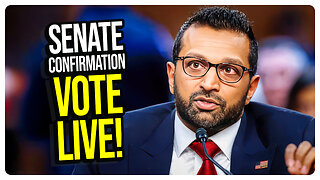Premium Only Content

Episode 2530: Restoring Divine Order: Reclaiming Traditional Parish Leadership
Utmost importance for the life of the Church: the increasing influence of women in parish leadership and how it has affected the authority of the priesthood, distorting the God-given hierarchy of the Church. As faithful Catholics, we must understand this issue in the context of tradition and divine order as established by Christ Himself, and we must recognize how the embrace of feminist ideals has infiltrated our parishes. In doing so, we will also explore a solution one that may seem radical but is firmly rooted in Sacred Tradition and Holy Scripture. Together, we will seek to restore the true order within the Church for the greater glory of God.
Let us begin by turning our hearts to the Holy Spirit for wisdom and guidance.
Come, Holy Spirit, fill the hearts of Thy faithful and enkindle in them the fire of Thy love. Send forth Thy Spirit, and they shall be created, and Thou shalt renew the face of the earth. Amen."
The Crisis in Parish Leadership
In many parishes today, there is a disturbing trend that reflects a deeper crisis within the Church: the faithful are often led not by the priest, the ordained shepherd of the flock, but by a council of well-meaning yet dominant women. These women, in their zeal for service, have come to dominate nearly every aspect of parish life administration, liturgy, and decision-making while the priest, who is the spiritual authority by divine law, is relegated to a mere figurehead.
The priest, whose very vocation is to guide and shepherd the faithful, often finds himself acquiescing to the will of these lay leaders. Why? Because the fear of complaints reaching the bishop, and the subsequent threat of having his faculties revoked or being reassigned, looms large. This imbalance distorts the natural order of the Church’s hierarchy, where the priest, standing in persona Christi, is intended to lead his flock as Christ leads His Church. Instead, the priest becomes more like a lamb, submissive and silent, following the directives of those who should be his flock.
How did we reach this point? It is a symptom of a broader issue: the rise of feminist ideals within the Church, which have eroded the traditional, male-centered leadership that Christ Himself instituted.
The Rise of Feminism and Its Impact on the Church
We must ask: How did the Church, whose leadership was established by Our Lord through His male apostles, come to embrace a feminized structure in many of its parishes? Historically, women held vital but distinct roles within the Church. Saints like St. Teresa of Ávila, St. Catherine of Siena, and St. Clare of Assisi were extraordinary leaders in their own right, but always within the framework of the Church’s hierarchy. They understood that their authority was distinct from that of the male priesthood and always worked in harmony with it.
In the years following the Second Vatican Council, there was an increasing call for inclusivity in the Church. While it began with noble intentions encouraging the laity to take an active role in serving Christ it quickly aligned with broader societal shifts towards feminism, which rejects traditional roles for men and women, especially in positions of authority. Today, many parishes no longer see women’s involvement as complementary to the priest’s leadership but as a form of control over the very structure Christ established.
We must recognize that this shift has theological consequences. It directly undermines the priest’s role as alter Christus, the one who stands in the person of Christ and is called to lead decisively. St. Paul, in his First Letter to the Corinthians (11:3), emphasizes the natural order established by God: 'The head of every man is Christ, and the head of the woman is man, and the head of Christ is God.' When we subvert this order, we introduce chaos, weakening both the priesthood and the Church.
The Theological Consequences of Feminized Leadership
This feminization of leadership within the Church creates confusion. St. Thomas Aquinas, in his writings on authority, reminds us that God’s natural order reflects the perfect hierarchy of heaven. The priest, standing as a spiritual father to his flock, must lead with strength and conviction. Yet when the priest is pressured to conform to feminist ideals or the demands of lay leaders, his role as a shepherd is compromised, and the spiritual health of the parish suffers.
As John Paul II reminds us in Mulieris Dignitatem, “Men and women have complementary roles in the Church. Yet, certain roles especially the priesthood are reserved for men by divine law. When this order is disrupted, the Church loses its strength, and the priesthood is diminished. Christ did not establish a Church of interchangeable roles; He established a Church based on a sacred, hierarchical order."
A Drastic but Necessary Solution
What, then, is the solution? Though it may seem drastic to some, it is quite simple: a return to the Church’s true, hierarchical, male-centered leadership as ordained by God. First, bishops must be willing to defend their priests, resisting the pressure to capitulate to parish councils and influential laypeople. The priest must be affirmed in his role as the spiritual head of the parish, and his authority must be upheld without fear of retribution.
Second, we must restore an authentic understanding of masculinity within the priesthood. The writings of Pope St. Pius X and St. John Paul II remind us of the necessity of strong, decisive male leadership in the Church. This means supporting our priests in their difficult decisions and rejecting the secular ideologies that threaten the integrity of their office.
Third, lay leadership, particularly among women, must return to its proper place. Saints like St. Monica and St. Gianna Beretta Molla show us that women can be powerful influences within the Church, but always in a manner that respects the ordained priesthood and the hierarchical structure instituted by Christ.
Finally, we must encourage a culture that reveres the priesthood and promotes vocations. The future of the Church depends on a strong, faithful priesthood. We must restore the dignity of the priesthood and encourage young men to answer this sacred call, knowing that their role is essential to the life of the Church.
Addressing Ethnic Divisions and Financial Responsibility
As if the challenges of lay leadership were not enough, many pastors today face another trial: the increasing ethnic divisions within their parishes. While the Church is truly universal, and Catholics of all nations bring rich traditions, this diversity can sometimes lead to fragmentation rather than unity.
Ethnic groups often introduce customs and practices that are meaningful to their heritage but may inadvertently cause divisions within the parish. This can be seen in liturgical preferences, music, and devotional practices. While these customs are beautiful expressions of faith, they must not supersede the unity of the parish as one Body of Christ.
Further complicating matters is the issue of financial responsibility. Some ethnic groups, while demanding special celebrations and customs, do not contribute financially to the parish’s upkeep. This places an undue burden on the pastor and long-time parishioners, creating resentment and division. St. Paul teaches us in 1 Corinthians 9:14, 'The Lord commanded that those who proclaim the Gospel should get their living by the Gospel.' Supporting the parish financially is not merely an obligation but a necessary act of stewardship.
We must foster a culture of shared responsibility within the parish, where all are called to contribute according to their means. Only then can the parish remain united and strong, serving the needs of all its members.
Conclusion and Final Prayer:
In closing, let us remember that the Church is not called to conform to the world but to transform it. To reclaim the dignity and strength of the priesthood, we must reject the feminist ideals and divisions that have infiltrated our parishes. Instead, we must return to the divine order established by Christ and His Church.
Let us pray:
O Lord, we pray for the renewal of Your Holy Church. Grant our priests the courage to lead with strength and fidelity, as true shepherds of Your flock. Inspire in the hearts of the laity a deep reverence for the sacred hierarchy You have established. May we, through the intercession of the Blessed Virgin Mary, St. Joseph, and all the saints, always strive to preserve the unity and purity of Your Church.
-
 LIVE
LIVE
Josh Pate's College Football Show
4 hours agoCFP Expansion: Latest Intel | CFB’s Schedule Problem | Arch Manning Hype | ACC Program Rankings
88 watching -
 LIVE
LIVE
LFA TV
23 hours agoTrump vs. Europe | TRUMPET DAILY 2.20.25 7PM
426 watching -
 31:02
31:02
Chrissy Clark
1 hour agoAn IVF Nightmare, Trump’s Illegal Immigration Crackdown, & Biden’s Student Loan Plan BLOCKED I URS
612 -
 1:02:57
1:02:57
In The Litter Box w/ Jewels & Catturd
1 day agoKASH CONFIRMATION TODAY! | In the Litter Box w/ Jewels & Catturd – Ep. 746 – 2/20/2025
82.6K68 -
 56:44
56:44
VSiNLive
3 hours ago $3.19 earnedFollow the Money with Mitch Moss & Pauly Howard | Hour 1
54K2 -
 1:08:41
1:08:41
John Crump Live
7 hours ago $1.04 earnedUSA v. Canada! Bigger Than Just A Game
19.4K6 -
 1:58:40
1:58:40
Revenge of the Cis
4 hours agoEpisode 1450: Wet Work
35.9K3 -
 3:36:29
3:36:29
vivafrei
10 hours agoKash Patel Confirmation Hearing LIVE! Jan. 6'er Kicked Out of CPAC? DOGE Wins in Court? & MORE!
253K254 -
 5:08:38
5:08:38
Barry Cunningham
10 hours agoTRUMP DAILY BRIEFING: KASH PATEL VOTE | WHITE HOUSE PRESS CONFERENCE | DOGE UPDATE
60.3K27 -
 1:57:54
1:57:54
The Quartering
8 hours agoRand Paul Praises Trump, Amazon Takes Control of Bond, and Delta Gives Passengers $30,000
110K39